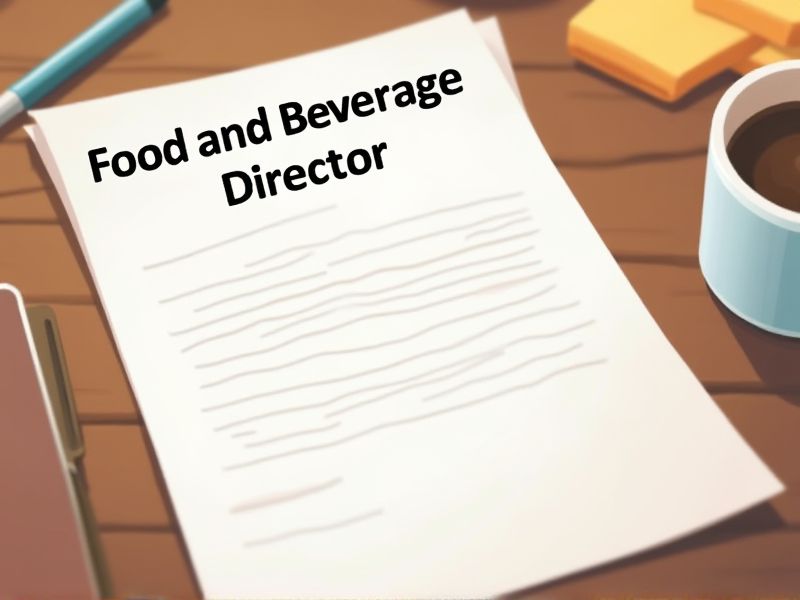
Being a Food and Beverage Director involves managing complex operations that demand specialized knowledge. Certifications provide industry-standard skills and comprehensive insights into food safety, customer service, and financial management. Certified professionals are more equipped to handle regulatory compliance, improving quality and efficiency in operations. Key certifications can significantly enhance a director's competency and credibility in the food service industry.
ServSafe Food Protection Manager Certification
The ServSafe Food Protection Manager Certification ensures a Food and Beverage Director possesses the necessary knowledge to manage food safety effectively, reducing the risk of foodborne illnesses. Certification builds trust with customers and regulatory bodies, demonstrating a commitment to health and compliance standards. By understanding critical safety protocols, directors can train and guide their teams better, leading to higher operational efficiency. Food safety incidents decrease, which often results in lowered liability risks and potential financial losses for the facility.
HACCP Certification
Having HACCP Certification equips a Food and Beverage Director with the knowledge to effectively minimize food safety hazards. This certification instills confidence in consumers and regulatory bodies, leading to increased trust and compliance with industry standards. It also helps prevent costly foodborne illness outbreaks, protecting both customer health and the company's reputation. With HACCP Certification, the director can ensure that systematic preventive approaches are in place, fostering efficient and safe food production processes.
Certified Food Safety Manager Certification
The Certified Food Safety Manager Certification equips a Food and Beverage Director with essential knowledge to ensure food safety and compliance with health regulations. This certification helps prevent foodborne illnesses by implementing proper food handling techniques. Knowledge from the certification boosts confidence among staff and consumers regarding the safety of the food service operation. Regulatory agencies often require such certification to maintain operation licenses, safeguarding the establishment against potential legal issues.
Certified Beverage Professional (CBP)
A Certified Beverage Professional (CBP) enhances credibility as a Food and Beverage Director by demonstrating specialized industry knowledge. Possessing a CBP certification supports improved beverage management skills, leading to increased profitability for establishments. Advanced expertise in beverage trends helps direct better menu curation and customer satisfaction. The industry recognition gained from CBP status opens opportunities for career advancement and networking within the hospitality sector.
Certified Hospitality Administrator (CHA)
The Certified Hospitality Administrator (CHA) certification represents a comprehensive grasp of industry management practices, which directly enhances a Food and Beverage Director's ability to oversee complex operations. Possessing a CHA designation can lead to improved decision-making skills, resulting in increased efficiency and profitability for hospitality establishments. The CHA certification underscores a commitment to ongoing professional development, providing Food and Beverage Directors with updated knowledge on evolving industry standards. Employers often regard the CHA as a mark of credibility and leadership, influencing recruitment and promotion decisions.
Certified Hospitality Supervisor (CHS)
Obtaining the Certified Hospitality Supervisor (CHS) credential often leads to enhanced leadership skills, which a Food and Beverage Director requires to effectively manage staff and operations. This certification can translate into improved team performance and morale, essential for maintaining high service standards in a fast-paced environment. Understanding of industry best practices is heightened through CHS, aiding directors in implementing efficient processes and ensuring consistent quality. Holding CHS may also boost credibility, providing stakeholders with reassurance of a director's commitment to professional growth and excellence.
Wine & Spirit Education Trust (WSET) Level 2 Award
The WSET Level 2 Award equips a Food and Beverage Director with comprehensive knowledge of wines and spirits, enhancing decision-making in selecting, pairing, and purchasing. This certification adds credibility and expertise, facilitating better training and mentorship of staff in hospitality settings. Understanding global wine markets and trends can improve menu development, thus potentially increasing sales and customer satisfaction. A director with this qualification can effectively navigate supplier negotiations, leading to more strategic procurement and cost management.
Certified Sommelier
A Certified Sommelier brings expert wine knowledge, enhancing the beverage program and elevating the dining experience, which can lead to increased customer satisfaction and revenue. Their training in wine and food pairing ensures menu offerings are harmonious, enriching the overall dining experience. A Food and Beverage Director with sommelier certification can effectively manage wine inventory and negotiate with suppliers, resulting in cost efficiency. Their expertise in creating wine lists that align with current trends helps maintain a competitive edge in the hospitality industry.
Foodservice Management Certification
Foodservice Management Certification equips a Food and Beverage Director with comprehensive knowledge of food safety regulations, ensuring compliance and reducing risks of foodborne illnesses. Structured training in cost control and budgeting obtained through certification enhances operational efficiency and financial performance in their establishments. Certification validates leadership and team management skills, enabling directors to effectively oversee staff and improve service quality. Possessing this credential typically increases trust from employers and customers, potentially leading to career advancement and enhanced reputation within the industry.
Project Management Professional (PMP) Certification
Obtaining a PMP certification enhances a Food and Beverage Director's ability to effectively manage large and complex projects, crucial in optimizing operational efficiencies. The certification provides a standardized framework for structuring project timelines, budgets, and resources, ensuring projects are completed within defined constraints. PMP-certified professionals have demonstrated competency in leading and directing diverse teams, fostering improved collaboration and innovative problem-solving in the fast-paced food industry. An understanding of risk management and quality control principles embedded in PMP training minimizes the potential for project disruptions, aligning with industry standards and customer expectations.
Summary
You can expect a Food and Beverage Director with certifications to enhance operational efficiencies, as they gain advanced knowledge and skills. This expertise typically leads to improved menu development and cost management, positively impacting the bottom line. Guests often experience elevated service quality and satisfaction due to updated standards and practices. Certifications usually bolster the director's leadership capabilities, inspiring and effectively guiding their team.
